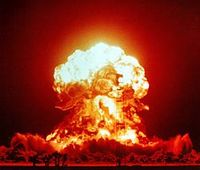Think of this as Volume 17, Number 31 of the newsletter I have written weekly since March, 1997. Enjoy.
Money that isn't working doesn't exist.
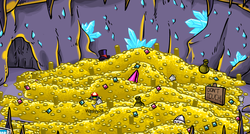 The world of fiction is filled with
The world of fiction is filled with
stories like that of Aladdin's Cave, where an innocent comes upon a
huge stash of loot and becomes wealthy.
But here's the big secret of money,
teased out over a long career covering business, finance and history.
The value of that money while it was in
the stash? Nothing. The value of money sitting in a cave? Also
nothing.
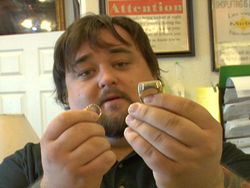 Money that isn't working has no value.
Money that isn't working has no value.
When Aladdin tried to “spend” all those gems and gold he found in
his cave, what mainly happened was that the value of gems and gold
outside the cave went down. Some people probably found other things
to trade with, things that had real value, value created by their
scarcity in trade.
If an ancestor was trying to get a loan on their
diamond ring after Aladdin came back from the cave, they probably
left the pawn broker muttering curses on Aladdin's hide and soul.
Money is just a medium of exchange, a
commodity. Any commodity worth anything becomes money when it's
exchanged. But when you eat the bread made from the wheat that was
traded on the Chicago Merc just last week, that bread becomes shit.
This is something conservatives can't
get their heads around. It's why we managed to recover from the Great
Recession.
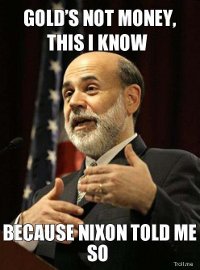 What happened after the recession was
What happened after the recession was
that money went on strike. Money cowered in fear, inside vaults, and
their equivalents. A lot of it went into gold, whose price boomed.
While it helped that the President put some money to work, almost $1
trillion worth in the 2009 stimulus, the impact of that rolled off
within about a year, and no more stimulus was forthcoming because
conservatives don't know money.
Thus, we've been left with just
monetary policy fueling our growth. The result is an economy
annoyingly similar, in some ways, to the one we left behind during
the Bush years.
In order to get the money that was
being hoarded back to work, Fed chairman Ben Bernanke created more
money. A lot more money. He pushed the value of loans toward zero and
beyond. Eventually, bankers took this free money and found ways to
make money with it. In the process of making loans on hard assets
they bid up the price of those assets, assets like houses.
Despite what anyone tells you, there's
a second housing bubble in America, created by all this free money.
Houses shouldn't be worth what they're now worth, given the size of
the underlying economy. A house, after all, is just a place to keep
your stuff. It's only worth what people can pay for it, and they get
that money from the real ecnomy. When we find better things to do
with money – when the value of money inevitably goes down because
it comes out of all the vaults and goes to work – we'll see that in
relative terms we have a housing bust.
 Money, you see, isn't really a noun at
Money, you see, isn't really a noun at
all. It's a verb. And it exists only in the marketplace. When it can
be exchanged for other things, and used to create things.
What does this mean for policy? Once
all the money comes back to work, money will be worth less. Physical
goods – the things money can buy – will be worth more.
Oil is a bit like money, in that it's a
valuable commodity. But it's also like the wheat in bread, because
once it's burned there's nothing left but pollution it costs more
money to clear out.
The real story of America today lies in
the oil industry's renewed ability to bring oil and gas to the
surface through fracking, and entrepreneurs' ability to coax more
energy out of the Earth using technology. The Sun shines, the wind
blows, etc.
Because we use so much energy, energy
currently has a high price. Good for frackers, good for America.
Drive through San Antonio sometime, in the center of the Eagle Ford
shale boom, and watch out for those new SUVs and pick-ups bought with
shale royalty money. A single barrel can be worth $22 to a landowner
right now, and 25 mcf of gas the same. Money is coming out of the
ground again.
With money coming out of the ground in
America, and with fracking remaining controversial elsewhere (or even
unnecessary), the price of oil stays up and we reap the benefits.
 But what happens when there is more
But what happens when there is more
energy than we temporarily need? What happens as efficiency
increases, as solar and wind costs continue to decline? The value of
all energy goes down. Oil, as a commodity, falls in price, and
marginal production is forced out of the market.
Thus the next recession comes more
clearly into view. Lots of money, too much really, turning into
inflation, with the relative value of money going down, along with
the value of assets like oil. People claim today's era is bad for
savers, but inflation is also bad, because you can't safely keep up
with it from the interest a bank pays. They're in the business of
buying money at one price and selling it at a higher one, after all.
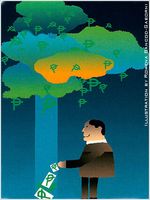 At the same time money is losing value,
At the same time money is losing value,
so oil and gas will be losing their value. Once people start seeing a
future where we need less oil and gas, the value of reserves in the
ground will start to decline, and the incentive to exploit what's
there, while its value is at its peak, goes up. That's the real match
lighting the fire. Aladdin comes back from his cave with diamonds,
people who need to eat go to the pawn broker with their diamonds, and
the value of diamonds goes down. Better to be in food. Better, then,
to be in stocks that create real value, companies that make stuff.
Whoever succeeds Bernanke then will
have the same job Paul Volcker had a generation ago, reining in the
money supply, causing new unemployment, until a new balance is
restored.
The best thing you can do with money is
use it to create new value. The best thing you can do with money is
put it to work, either lending it, or investing it in a money making
enterprise, despite the risks, or in just spending it. Money makes
the world go round, and when it's not doing that, the economic world
just doesn't go around.
That's what I've learned about money.


